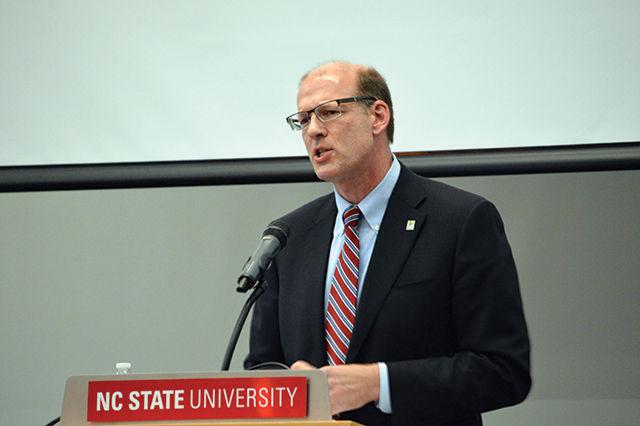
Kaydee Gawlik
Jonathon Reckford, the chief executive officer for Habitat for Humanity International, speaks at Hunt Library in the Duke Energy Hall on Thursday, January 14th, 2016. Reckford's speech focused on the challenges involved with leading an internatinal nonprofit organization. Reckford grew up in North Carolina, graduating from the University of North Carolina, Chapel Hill with a degree in political sciences. Reckford also graduated from the Stanford University Graduate School of Business in Palo Alto, California, for business administration with a concentration in public and non-profit management.
Jonathan Reckford, the CEO of Habitat for Humanity, revisited his home state of North Carolina on Thursday evening at Hunt Library. Habitat for Humanity is a Christian housing nonprofit funded by millions of donors, ranked as the #1 service brand in America by the Harris Poll.
Reckford pointed out his blue-and-red tie and jokingly opened the crowd with, “Thank you for welcoming a Tarheel,” being a Chapel Hill native. He spoke on his encouragement of healthy competition between the Habitat for Humanity chapters of NC State and Chapel HIll. NC State’s has been around since 1991.
However, the biggest priority of the nonprofit hasn’t been competition, but compassionate collaboration. Beyond the Tarheel-Wolfpack remark, Reckford joked that he has seen the organization bring Democrats and Republicans together to build houses. He noted that they have always been radical about inclusion.
“God is our center, not our border,” Reckford said. “Decide who you are before what you do.” The “who” for Habitat is a Christian ministry, first and foremost. And the “what” is building homes for anyone in need.
Their mission statement is “Seeking to put God’s love into action, Habitat for Humanity brings people together to build homes, communities, and hope.”
Reckford cleared the air about some common misconceptions people have about Habitat for Humanity. The nonprofit was not founded or is run by Jimmy Carter, though the president was very involved in it. And they do not just give houses away to people. Families do have to pay for the house in the end, but Habitat for Humanity makes it a point for the mortgages and loans to be very affordable.
There are two kinds of problems in this world and two kinds of opportunities, Reckford said. A current problem is one that causes immediate discomfort and an anticipated problem is one that causes impending discomfort. Missing a current opportunity is losing something that was immediately within our grasp and missing an anticipated opportunity is losing something that could have been possible.
With all of these problems and opportunities, Reckford said, “it is unacceptable to stay still. If you’re not unhappy with the status quo, it’s hard to get people to change.”
Cooperative collaboration and active hard work is all well and good, but a big criticism that Reckford and the nonprofit constantly deal with is the accusation of not having enough data. His rebuttal was that that isn’t typically what draws in the general public and inspires them to make changes. However, for the evening’s presentation, he did give some numbers and show some charts.
Some examples of data he provided include how houses with weatherization drop utility costs anywhere between 25 to 40 percent. Nearly 90 percent of the work Habitat for Humanity does is outside of the United States, but they are currently working with 270 cities doing neighborhood revitalization. When Hurricane Andrew hit Florida in 1992, the only two houses that stood in a Floridian neighborhood were built by Habitat for Humanity.
“Hearts aren’t changed by data, they’re changed by stories. What’s the issue that grabs your heart?” asked Reckford while retelling heartwarming stories from his experiences in Taiwan, Bolivia and Nepal.
“It’s all about making it personal,” said Reckford, on the nonprofit’s success. “Never doubt the ripples of impact you can make.”